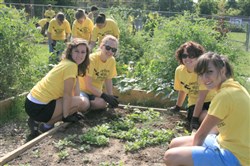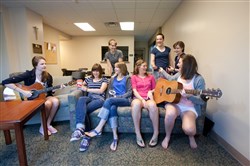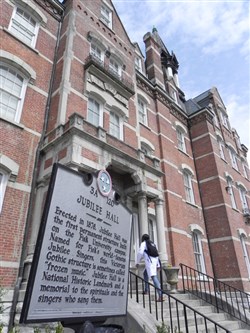VOL. 37 | NO. 14 | Friday, April 5, 2013
College 2.0: Four years, a diploma and employment
By Hollie Deese
Half the graduates who leave college each year have no job or are underemployed. Educators and administrators at some of Middle Tennessee’s smaller colleges and universities have seen those numbers, which come from a 2012 analysis of government data conducted by the Center for Labor Market Studies at Northeastern University, and are confronting the issue with an increased focus on science and technology education.
But it’s not all about the classroom. These schools are building partnerships with businesses and nonprofits, finding ways to combine disciplines that meet practical and social needs.
Cumberland University, for example, made significant changes last year to offer the nearly 1,100 students on its Lebanon campus the most efficient path to earning a degree and finding gainful employment.
“We recently restructured our schools into three more comprehensive, cohesive and effective schools designed to help the university maximize its academic value to students,” says Phillip Carter, executive director of communications at Cumberland.
“The goal of these changes is to create more synergy among programs and disciplines. Ultimately, this will contribute to the competitiveness of a CU graduate after leaving college.”
Internships, jobs in town
Cumberland opened a new office of internships on campus to provide a more direct way for students to connect with an advisory board of about 50 business owners, leaders and managers – many of whom participate as on-campus guest lecturers.
“Many of them will hire our students as interns and, ultimately, when they graduate, they will hire them full time,’’ says Professor Paul Stumb, dean of Cumberland’s Labry School of Science, Technology and Business, one of the three new educational divisions that help students move toward a career.
The School of Humanities, Education and the Arts and the Rudy School of Nursing and Health Professions are the others.

Trevecca Nazarene University students get hands-on experience in a community garden, part of the school’s social justice program.
-- Photo Courtesy Of Trevecca Nazarene University“The majority of our students [in the Labry’s School] are going into their own family businesses or will go to work for other businesses, and we feel like we are preparing them better than a lot of mainline traditional business schools,” Stumb adds.
Some students elect to pursue graduate degrees, but others are at Cumberland to get their degree and get on with their life.
Gabriel Lamog did both. He earned a bachelor’s degree, landing a job before graduation day. He followed up by earning a master’s from Cumberland while teaching at Friendship Christian School in Lebanon.
“Cumberland had me prepared for the job market,’’ says Lamog who teaches band, choir and Spanish.
Catlin Gentry, 23, graduated from Cumberland last May with a major in accounting and a minor in computer information systems. He is ending his first year of a two-year MBA program on campus while also working part-time at RockTenn, a Georgia-based packaging company with a facility in Lebanon. He got an internship there after his senior year. And if not for his graduate assistant position at Cumberland, he would have a full-time position with them, as well.
His current role at RockTenn doesn’t have anything to do with accounting. “It is tailored more towards computer work, which I enjoy a lot more,” the Mt. Juliet native says.
“The great thing about Cumberland is how connected the professors are with the students. If I have a problem at work and cannot figure out how to complete a project, I know I can find a member of the faculty to assist me, which would not be available at larger universities.”
Blending technology and business
Stumb says he wants the Labry School’s graduates to be bilingual in business and technology, fully able to understand and operate efficiently in the traditional world of business.
“Carl Sagan said that we live in a world that is exquisitely dependent on science and technology, in which almost no one understands anything about science or technology,” he says. “And that is so true, especially in the business world in particular.
“Technology is transforming almost every business and industry, and we have recognized the need to cultivate science and technology both into the business curriculum. The business community has been asking for that.’’
Teaching a practice that changes and evolves so frequently is not an easy task, but one Cumberland has embraced wholeheartedly, thanks to a close relationship with the local business community.
“Every 18-24 months, 50 percent of what is cutting edge technology today is obsolete,” Stumb says. “It is really difficult for our faculty and difficult for our students, but we really make a concerted effort to stay on top of those technological changes.
“That is one of the reasons we want to stay plugged in to the community because the business community will tell us what changes are just passing fads and what is impactful to their business and what we need to focus on training our students in.”
Cumberland President Harvill Eaton says all of higher education is in transition because there are “more people, more schools and more technology, which puts jobs out of place.
“Like newspapers,” he adds. “There used to be The (Nashville) Banner and The Tennessean. One is gone and the other is changing. You have to re-examine what you are doing, whom you are serving, what their needs are and then you have to adjust. And that is what we are doing at Cumberland. And I would argue every school is figuring that out in their own way.’’
Other smaller colleges and universities in the Nashville area are indeed working to address the workforce issue, looking for answers that fit their overall mission.
Aquinas College
One of only two Catholic universities in the state, Nashville’s Aquinas College added a residence option for all students this fall along with graduate programs for nursing and education.
“We had come to the point in both our education and nursing programs where people were saying they wanted to go further, they wanted to stay here, and they wanted to know more,” says Sister Elizabeth Anne Allen, provost and vice president for academics at Aquinas.

Aquinas College has opened its doors to student residents for the first time this year. Students live in Seton Lodge near St. Thomas Hospital and take advantage of the cafeteria and other services.
-- Photo Courtesy Of Aquinas College“There is a great shortage in nurse educators and both programs have been met with great success. We have a very enthusiastic core of graduate students.”
About 600 students attend the school, located on 83 acres adjacent to St. Thomas Hospital on Harding Road. The new resident students live at Seton Lodge behind the hospital, which gives the students the benefit of the hospital’s round-the-clock security and access to the cafeteria, wellness center, medical library and chapel.
“We are unique,” Sister Allen explains. “Tennessee is not a largely Catholic state and has the smallest Catholic population of any state percentage-wise, 3.7 percent of the whole state. So if we wanted to really serve the Catholic population we had to have a residence program.”
These first residents at Seton Lodge also are part of a pioneering house system implemented by Aquinas President Sister Mary Sarah based on the Oxbridge model, an ancient design for university life that has made a comeback in recent years.
“It is such a good way to build community and develop relationships,” Sister Allen adds. “The house systems incorporate the faculty, staff, students, alumni, and community members into four houses for men and four for women, each with a saint as a spiritual patron.
“Becoming a residential college allowed us to be more to the disposal of the whole church,” Sister Allen says. “Catholics could choose it because it is Catholic, but we have non-Catholics here too and it is a great place.”
Sister Allen thinks the success of the students comes from the community they build while at Aquinas.
“It is a real learning community,” she says. “The relationship and interrelationship of the faculty, staff and students is just enriching and the house system certainly is a testimony to that too.”

Fisk University’s research in the physical sciences ranks in the top 3 percent nationally, while its overall research ranks in the top 8.
-- Photo: Lyle Graves | Nashville LedgerAnd despite serving Catholic students, people of all faiths are welcome, she says.
“Even though people are of different faiths, faith is the thing that unites us all because it is based on the dignity of being a person,” she says.
“And that is the animating spirit of it. Every person is respected and fostered and it leads to beautiful relationships that allow people to learn together.”
Tuition is about $20,000 a year, with room and meals adding another $4,500 a semester, with financial aid available to qualifying students. In fact, more than 90 percent of students receive some sort of financial aid from the school.
Fisk University
Edwina Harris Hamby, vice president for institutional advancement at Fisk University since 2011, was an idealist Fisk student in the 1970s.
“We didn’t have everything that my friends at Vanderbilt or Peabody had,” she recalls. “What we had that they didn’t have was a camaraderie, a bond to the university, a bond to the legacy of all these people on whose shoulders we stood. We understand that clearly.”
Hamby says it’s that pride and commitment to the university’s historic past that guides students today.
“Anything that would be a measurement of excellence in the academic arena, Fisk is it,” she says.
One of the most popular areas of study at Fisk is science, technology, engineering and math. But Fisk has an edge in that area of expertise that goes back to 1950 when Nelson Fuson developed an infrared research program at the school that established the school as a scientific intellectual hub.
“We are No. 1 in the Southeast among liberal arts institutions for funded research, so we have a cadre of about 14 scientists here who are pure researchers,” Hamby says. To date, the school has won three R&D (Research and Development) 100 awards, which recognize and celebrate the top 100 tech products of the year.
In 2010, Fisk was honored for its groundbreaking development of hypersensitive crystals used in the detection of radiation.
“Our scientists are really doing phenomenal things in both growing these crystals for homeland security issues, as well as for in research in cancer and other diseases, and that is very impressive,” Hamby says.
In the fall of 2004, Fisk and Vanderbilt teamed for their Master’s-to-Ph.D. Bridge Program, which has produced five Ph.D. graduates in the past three years in physics, astronomy and materials science. Last year the program graduated five Ph.D. recipients in the physical sciences and is on track to graduate that same number each year. This is 10 times the national average for physical science Ph.D. programs.
In September 2012, the National Science Foundation released its most recent study ranking U.S. higher education programs by their expenditures in research and development. Fisk’s research in the physical sciences ranks in the top 3 percent, while Fisk’s overall research ranks in the top 8 percent among all U.S. universities and colleges.
A majority of Fisk graduates – 61 percent – enter graduate or professional schools within one year of their graduation. The national average, according to the National Association of Colleges and Employers, is 23 percent.
Annual tuition at Fisk is about $29,550 for undergrads and graduate students, a cost that includes housing. Without housing, the price drops to $18,500.
Trevecca Nazarene University
At first blush, one might think a career in service would be anything but profitable. But for the faculty, students and staff at Trevecca Nazarene University, that couldn’t be further from the truth.
On campus, the consensus is that success comes from so much more than a paycheck. But they make sure graduates are getting those, too.
“Because we are a Christian community providing education for leadership and service, that’s our vision,” says Kathy Baugher, associate provost and dean of enrollment management. “We believe that we do best in those academic programs that are really geared and centered that way.”
Majors in worship arts and ministry are a draw for students who feel called to serve people, but perhaps surprisingly, so are science and engineering.
“People who feel called to the mission field use those kinds of services,” Baugher adds. “Our physician’s assistant program, graduate counseling and education, they all have a real service component and develop leaders in those fields. I think that is what TNU really excels in.”
Trevecca created the J.V. Morsch Social Justice Center in 2009 to create an environment for students of many different vocational interests to learn and practice solving real-world problems.
“The core of the program is interdisciplinary, and students take classes in social justice, social work, sociology, criminal justice, business, religion – they get a broad range of classes hand-selected for the core,” says program director Jamie Cassler, M. Div, LMSW, RPT. “And the types of jobs our students are getting are varied.
One recent graduate got a job at the Salvation Army as the director of the Life Skills Learning Center. Another is the supervisor at a homeless shelter in Virginia. One works with Hands and Feet, a non-profit ministry that works with orphans in Haiti.
“There are a variety of different ways you can go after getting a degree in social justice,” Cassler explains. “And there are a host of master programs you can go to as well. The nice thing about the major is that it is flexible enough that we can tailor the course to prepare them for where God is leading them down the road.”
Trevecca’s approach to offering social-based programs with a realistic focus is paying off. According to U.S. News and World Report, the freshman retention rate at the school is 71.5 percent.
And five years into the social justice program, students are transferring from other schools just to be involved, with 20 transfers in the past few years. “I feel like we are offering a degree that students want enough that they are willing to transfer from around the country to come to Trevecca,” Cassler says.
Tuition at Trevecca is $20,790 a year, and with a room and meal plan, the total comes to $28,278.